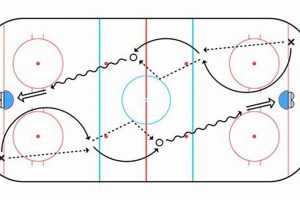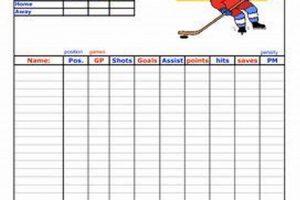A youth sports organization centered in New Jersey provides ice hockey programs for various age groups. These programs aim to develop young athletes’ skills and foster a passion for the sport. They often participate in regional leagues and tournaments, offering competitive opportunities for players.
Participation in such programs offers numerous advantages, including improved physical fitness, teamwork skills, and discipline. The historical context often involves a tradition of hockey within the region, contributing to a strong community and dedicated coaching staff focused on player development and sportsmanship.
The following sections will delve into specific aspects of the organization’s structure, program offerings, and impact on the local hockey community. Analysis of team performance, coaching methodologies, and community involvement provides a fuller understanding of its role.
Tips for Aspiring Hockey Players
Success in youth hockey requires dedication, discipline, and a focus on continuous improvement. The following tips offer guidance for players seeking to enhance their skills and achieve their goals.
Tip 1: Master Fundamental Skills: Prioritize skating, stickhandling, passing, and shooting. Consistent practice of these core skills forms the foundation for advanced play. For example, dedicate specific practice time to edge work and puck control drills.
Tip 2: Develop Physical Conditioning: Hockey demands strength, speed, and endurance. Implement a training regimen that includes cardiovascular exercises, strength training, and agility drills. Off-ice training is crucial for on-ice performance.
Tip 3: Study the Game: Watch professional hockey games and analyze player movements, strategies, and tactics. Understanding the game beyond individual skills enhances decision-making on the ice. Reviewing game footage and identifying areas for improvement is valuable.
Tip 4: Listen to Coaches: Coaches provide valuable guidance and instruction. Actively listen to their feedback and implement their recommendations. Respect for coaching is paramount for player development.
Tip 5: Emphasize Teamwork: Hockey is a team sport. Prioritize communication, support your teammates, and work towards common goals. A cohesive team dynamic fosters success. Developing strong on-ice and off-ice relationships improves team performance.
Tip 6: Maintain a Positive Attitude: A positive mindset contributes to resilience and perseverance. Focus on effort, improvement, and overcoming challenges. Mental toughness is as important as physical skill.
Tip 7: Prioritize Rest and Recovery: Adequate rest and recovery are essential for preventing injuries and maximizing performance. Ensure sufficient sleep, proper nutrition, and active recovery techniques such as stretching and foam rolling.
Implementing these tips can significantly contribute to a player’s development, both on and off the ice. Dedication to these principles will cultivate a strong foundation for a successful hockey career.
The next section will explore the specific training programs and coaching philosophies employed within successful youth hockey organizations.
1. Youth Development
Youth development, as it pertains to the ice hockey program, encompasses a multifaceted approach to fostering growth in young athletes, both on and off the ice. The program aims to instill valuable life skills while honing hockey proficiency.
- Skill Acquisition and Refinement
The program provides structured training designed to impart fundamental hockey skills, such as skating, stickhandling, passing, and shooting. Dedicated practice sessions focus on refining these skills, allowing players to progress from basic techniques to advanced maneuvers. This skill development not only enhances on-ice performance but also cultivates a sense of accomplishment and self-confidence.
- Character Building
Participation in team sports, like ice hockey, promotes the development of key character traits, including discipline, teamwork, and sportsmanship. Players learn to cooperate with teammates, respect coaches and officials, and handle both victory and defeat with grace. These experiences contribute to the development of responsible and ethical individuals.
- Physical Fitness and Health
Ice hockey is a physically demanding sport that requires strength, speed, and endurance. The program encourages regular physical activity, promoting overall fitness and health among young participants. Through training and competition, players develop cardiovascular fitness, muscular strength, and agility, which are beneficial for long-term well-being.
- Leadership and Responsibility
As players progress through the program, opportunities arise for them to assume leadership roles within their teams. This fosters a sense of responsibility and encourages them to take initiative. Experienced players serve as role models for younger teammates, guiding them and setting a positive example both on and off the ice. This cultivates future leaders within the hockey community.
Through these facets, the ice hockey program serves as a catalyst for youth development, equipping young athletes with the skills, character traits, and values necessary for success in hockey and life. The program’s holistic approach ensures that participants not only become better hockey players but also well-rounded individuals.
2. Competitive Leagues
Participation in competitive leagues forms a cornerstone of the organization’s structure. These leagues provide a structured environment for players to test their skills, apply learned strategies, and experience the dynamics of team competition. Involvement is not merely recreational; it is integral to the development pathway for young athletes, shaping their abilities and fostering a deeper understanding of the sport. For instance, a specific team might compete in a regional league, facing opponents from various towns and cities, thus exposing them to diverse playing styles and skill levels.
Competitive leagues serve multiple purposes within the organization. They offer tangible goals for teams to strive for, such as winning championships or achieving specific rankings. These goals motivate players and coaches, driving them to invest time and effort in training and preparation. Furthermore, participation allows coaches to assess player performance under pressure, identify areas for improvement, and refine coaching strategies accordingly. Exposure to diverse competitive environments also cultivates adaptability and resilience in players, preparing them for future challenges in hockey and beyond. Success in these leagues often leads to increased visibility and opportunities for players to advance to higher levels of competition.
In summary, competitive league participation is not simply an extracurricular activity; it is a fundamental element that shapes the organization’s identity and contributes significantly to player development, team cohesion, and the overall success of the hockey program. The challenges inherent in competitive play, such as dealing with adversity and managing pressure, are invaluable learning experiences. These experiences prepare athletes for future endeavors and underscore the importance of competitive leagues within youth sports organizations.
3. Skill Enhancement
Skill enhancement is a primary objective within the youth hockey program. It is a structured process focused on developing and refining the fundamental and advanced abilities necessary for success in the sport.
- Focused Training Regimens
Specialized training sessions are designed to improve skating technique, stickhandling proficiency, passing accuracy, and shooting power. These sessions utilize drills and exercises that target specific muscle groups and neural pathways, leading to measurable improvements in performance. For example, skaters might participate in edge control drills to enhance agility and balance, critical for maneuvering on the ice.
- Individualized Coaching
Coaches provide personalized feedback and guidance to each player, identifying areas for improvement and tailoring training plans accordingly. This individualized approach ensures that players receive the specific attention they need to progress at their own pace. For instance, a coach might work with a player on their wrist shot technique to increase accuracy and velocity.
- Advanced Skill Development Programs
Beyond basic skills, the organization may offer specialized programs that focus on advanced techniques, such as power skating, defensive positioning, and offensive strategy. These programs are designed to prepare players for higher levels of competition. An example might include specialized clinics on puck protection and zone entry strategies.
- Video Analysis and Feedback
The use of video analysis allows players and coaches to review game footage and training sessions to identify areas for improvement. This objective feedback provides valuable insights into player performance and facilitates targeted adjustments to training plans. A coach might use video to demonstrate proper technique and highlight areas where a player can improve their positioning.
Through these multifaceted approaches, the program strives to enhance the skills of each player, enabling them to reach their full potential on the ice. The emphasis on skill development contributes to individual growth, team success, and the overall competitiveness of the organization within the regional hockey landscape.
4. Team Building
Team building constitutes an integral component of the youth hockey program. It fosters cohesion, enhances communication, and cultivates a supportive environment, ultimately contributing to improved on-ice performance and a positive experience for all participants.
- Development of Trust and Camaraderie
Team-building activities, both on and off the ice, are designed to foster trust and camaraderie among players. These activities range from team practices and drills to social events and community service projects. For instance, a team might participate in a volunteer event together, fostering a sense of shared purpose and strengthening bonds outside of the competitive arena. Strong interpersonal relationships enhance communication and cooperation during games.
- Enhancement of Communication Skills
Effective communication is crucial for success in ice hockey. Team-building exercises emphasize clear and concise communication among players, coaches, and staff. Players learn to communicate effectively on the ice, relaying information about positioning, strategy, and player movements. Off-ice communication is also promoted, creating an environment where players feel comfortable sharing ideas and concerns. Open communication facilitates a more cohesive and responsive team dynamic.
- Establishment of Shared Goals and Values
Team building helps establish shared goals and values that guide the team’s actions and decisions. Players collectively define team objectives, such as winning a championship or improving overall performance. They also identify core values, such as sportsmanship, respect, and perseverance, which serve as guiding principles for their conduct. Shared goals and values create a sense of unity and purpose, motivating players to work together towards common objectives.
- Promotion of Leadership and Responsibility
Team-building activities often incorporate opportunities for players to develop leadership skills and assume responsibility within the team. Senior players might mentor younger teammates, providing guidance and support. Players might also be assigned specific roles and responsibilities, such as leading warm-up drills or organizing team events. These experiences cultivate leadership qualities and foster a sense of ownership within the team.
The emphasis on team building contributes to a more cohesive, supportive, and successful hockey program. These activities provide the foundation for improved on-ice performance, creating a positive and enriching experience for all participants. Ultimately, a strong team dynamic can be a differentiating factor in competitive scenarios.
5. Community Involvement
Community involvement constitutes a vital, symbiotic relationship for the hockey organization. The team’s presence and activities within the local community serve as a significant driver of support, visibility, and overall sustainability. Active participation in community events, charitable initiatives, and youth outreach programs creates a positive image, fostering goodwill and building a strong base of local support. For instance, the team might participate in local parades, host youth hockey clinics, or support local charities. This demonstrates a commitment extending beyond the rink.
The importance of community engagement extends beyond mere public relations. It directly influences player recruitment, sponsorship opportunities, and fan engagement. A strong community presence attracts young players to the program, ensuring a steady stream of talent. Local businesses are more likely to provide sponsorship support when the organization actively contributes to the community’s well-being. Moreover, community involvement increases fan attendance at games and events, creating a vibrant and supportive atmosphere. Failure to engage with the community can result in decreased visibility, diminished support, and ultimately, a decline in the organization’s overall viability. The effect is direct: more community work, more support.
In summary, community involvement is not simply an added benefit but an essential ingredient for the long-term success. Cultivating relationships with local residents, businesses, and organizations fosters a sense of shared ownership and responsibility. While the hockey program faces the ongoing challenge of balancing on-ice performance with community outreach, a proactive and sustained commitment to community involvement is a critical investment. This ensures a brighter future for the organization and a stronger connection with the local community. The two are intertwined.
6. Dedicated Coaching
Dedicated coaching forms a foundational pillar of the hockey program, directly influencing player development, team performance, and the overall success of the organization. Consistent, informed instruction and mentorship are essential for cultivating skills and promoting a positive team environment.
- Skill Development and Refinement
Dedicated coaches provide structured training sessions designed to improve fundamental hockey skills. These sessions incorporate drills, exercises, and personalized feedback aimed at enhancing skating technique, stickhandling proficiency, passing accuracy, and shooting power. For example, coaches might focus on individual skating flaws to improve overall agility. The resulting skill enhancement improves individual performance and contributes to overall team effectiveness.
- Strategic Game Planning and Execution
Coaches play a critical role in developing game plans, strategizing against opposing teams, and making in-game adjustments. They analyze opponent strengths and weaknesses, design offensive and defensive strategies, and communicate these strategies effectively to the players. This involves reviewing game footage, adjusting line combinations, and making tactical decisions to optimize team performance. A well-executed game plan, guided by dedicated coaching, increases the team’s chances of success.
- Mentorship and Character Development
Coaches serve as mentors, instilling values such as discipline, teamwork, and sportsmanship. They provide guidance and support to players, helping them navigate challenges both on and off the ice. Coaches foster a positive team culture that promotes respect, integrity, and personal growth. Mentorship extends beyond hockey skills, shaping players into well-rounded individuals who embody the organization’s values. An example is a coach emphasizing respect for referees, regardless of the call.
- Player Evaluation and Development Pathways
Dedicated coaches are responsible for evaluating player performance, identifying strengths and weaknesses, and developing personalized development pathways. They monitor player progress, provide regular feedback, and adjust training plans as needed. Coaches also assist players in setting goals and achieving their full potential. The evaluation is consistent and used as feedback to the player. Individual development pathways are then tailored to specific needs. The pathways could include external training that helps the player improve in his individual areas.
These facets of dedicated coaching are interwoven with the success of the youth hockey program. Structured instruction, strategic planning, mentorship, and player evaluation all contribute to player growth and team competitiveness. Coaches nurture skill development and help players become well-rounded individuals with a solid foundation of ethics.
Frequently Asked Questions
This section addresses common inquiries regarding the youth hockey program. The information provided aims to clarify program details and expectations for participants.
Question 1: What age groups are eligible to participate?
Eligibility for participation spans various age divisions, commencing with introductory programs for young children and extending through competitive levels for adolescents. Specific age requirements are available on the program website or through direct contact with the registration office.
Question 2: What are the registration fees and associated costs?
Registration fees vary depending on the age division and program level. These fees generally cover ice time, coaching expenses, league dues, and administrative costs. Additional expenses may include equipment, travel costs for away games, and team-related activities. A detailed breakdown of fees and associated costs is available upon request.
Question 3: What equipment is required for participation?
Mandatory equipment includes a helmet with a face mask, shoulder pads, elbow pads, gloves, hockey pants, shin guards, skates, and a mouth guard. Specific equipment standards must adhere to established safety guidelines. It is recommended that participants consult with experienced personnel for proper equipment fitting and selection.
Question 4: What is the practice schedule and game schedule?
Practice schedules vary depending on the age division and team level. Generally, teams practice two to three times per week, with games scheduled on weekends. Specific schedules are distributed at the beginning of each season and are subject to change based on ice availability and league regulations. Notifications of schedule changes are communicated promptly to all participants.
Question 5: What is the program’s coaching philosophy?
The program’s coaching philosophy emphasizes skill development, teamwork, sportsmanship, and respect for the game. Coaches are expected to provide a positive and supportive learning environment, promoting individual growth while fostering a cohesive team dynamic. Coaching staff must adhere to established ethical guidelines and safety protocols.
Question 6: What is the program’s policy on player safety?
Player safety is a top priority. The program adheres to strict safety protocols, including mandatory equipment requirements, concussion management protocols, and emergency action plans. Coaches and staff are trained in first aid and CPR. A zero-tolerance policy exists for any behavior that compromises player safety or well-being.
Key takeaways from this FAQ section emphasize the organizations commitment to player development, safety, and ethical conduct. The program strives to provide a positive and enriching experience for all participants.
The following section will delve into alumni success stories.
Conclusion
The preceding exploration of “nj ice dogs hockey” has illuminated key organizational facets. Skill development, competitive league participation, community involvement, and dedicated coaching have been identified as critical components. These elements, when effectively integrated, contribute to a robust youth hockey program.
The demonstrated ability to foster young athletes, promote teamwork, and instill valuable life skills positions such programs as significant assets within the broader community. Sustained support for these organizations is essential, ensuring the continued development of future generations of hockey players and responsible citizens. Continued observation and support of this and similar organizations remains key to the future health of youth sports.







